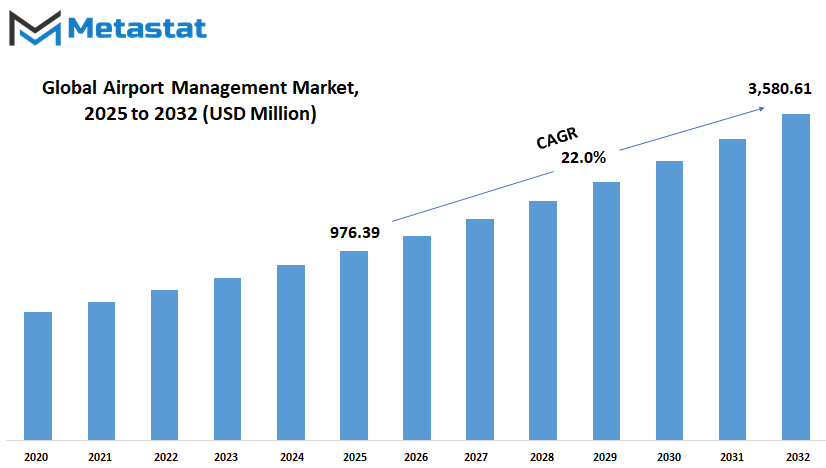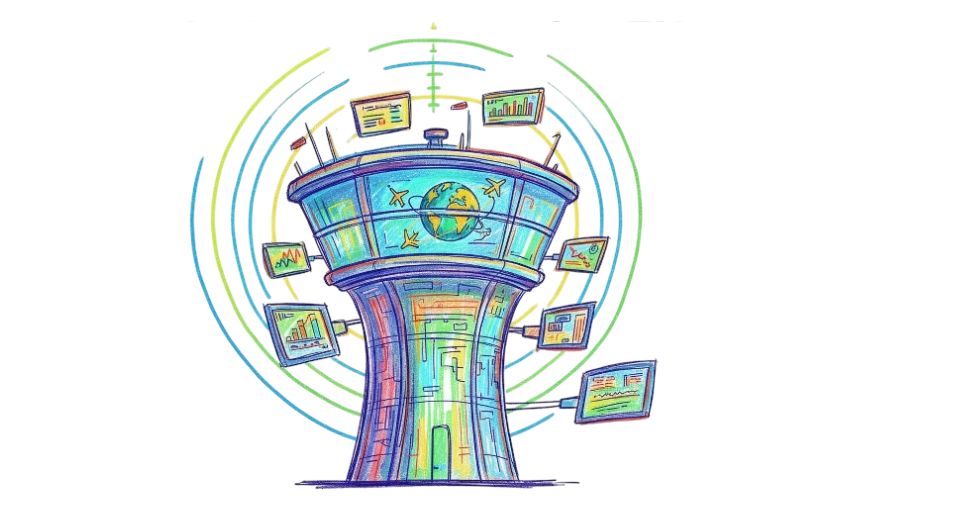MARKET OVERVIEW
The global airport management market is a market being reshaped by technological developments, operational needs, and rising passenger expectations. This industry involves the optimization of airport management, such as infrastructure, logistics, and services, to facilitate smooth operations. The global airport management market will redefine airport system efficiency in the context of changing aviation, new technologies, and new challenges.
The management firm appears to wish for a dynamic collaboration between operating managers and passenger experience. This will arrive in the form of a set of digitalization including the application of new-generation technologies and tools for decision-making in the near term. Artificial intelligence, big data, and machine learning would drive the monitoring of operations trends at airports to enable managers to track movement of traffic and delays and maximize overall efficiency of terminal operations. In addition, the use of real-time analytics will enable more acute resource allocation and forward-looking problem-solving, driving on new levels of operational excellence. The global airport management market will also reflect a heightened concern for sustainability.
Public and regulatory pressures regarding environmental issues will compel airports to create environmentally friendly operations. Renewable sources of energy, waste management programs, and carbon offsetting schemes will become realities in airport operations. Green certifications will become the standard of excellence, leading airports to incorporate energy-efficient technologies into daily operations. Sustainability will no longer be an extra feature but will become a part and parcel of operational architectures. Security will be another important area of growth for the global airport management market. As global threats change in nature, airports will emphasize sophisticated security systems to safeguard people and freight. Biometric authentication, automated screening technology, and AI-based surveillance technology will reshape security processes. These technologies will not only improve safety but accelerate the process of security clearance, striking a balance between vigilance and speed.
The sector will also see a change in passenger interaction strategies. Airports will shift towards the delivery of bespoke experiences through data-driven insights, which will provide differentiated services for unique requirements. Interactive terminals with intelligent features will serve travelers who value convenience and comfort. This is not limited to digital interfaces alone but will be extended to retail products, food, and even entertainment facilities within airports. The Global Airport Management business will ultimately embody the changing expectations of a modern traveler who places worth in terms of convenience, speed, and luxury. Stakeholder cooperation will also decide the direction of the market. Airlines, airports, technology providers, and government agencies will come together to manage operational issues and capitalize on opportunities. Unified systems will enable streamlined communication between partners to attain synchronized operations and better overall performance. The partnership would be extended to city planners and transportation officials to improve connectivity with local infrastructure from the airport.
The global airport management markets are to experience a transformation journey over the next few years with innovation and the adoption of trends worldwide. It will shape the future of aviation while reshaping passenger experience, operations standards, and sustainability goals. Its future growth will represent efficiency and flexibility, and thus, it is crucial that airports are at the vanguard of bringing people and communities together in the global experience towards progress.
Global airport management market is estimated to reach $3,580.61 Million by 2032; growing at a CAGR of 22.0% from 2025 to 2032.

GROWTH FACTORS
The global airport management market with more air passengers and better technologies in airport management. With more travel spreading across the globe, airports are increasingly being asked to manage operations effectively while keeping passengers safe and improving general traveler experience. The increased air traffic has compelled airports to adopt new systems that ease check-ins, security, baggage transfer, and air traffic control. Not only do these developments enhance the convenience of travelers but also increase operational efficiency, making them a priority area for the industry. Even though these future developments are some interesting prospects, regulatory control and compliance problems present huge market obstacles in the airport's case.
Such airports possess stringent safety and environmental standards that make it costly as well as a time-consuming affair. Heavy investment is needed in the airport's infrastructure in terms of new development and upgrading. It may be an issue for most to implement a complete Advanced Management System. Strategic planning and sufficient availability of funds, thus, become crucial for the effective management of airports in such situations. In spite of these issues, the uptake of smart airport technology has a potential for future market expansion.
New technologies like biometric verification, real-time data analysis, and automated passenger services are gradually making airports smart and efficient from dumb infrastructures. Integration of intelligent technologies will enable airports to serve uninterrupted customer experiences, reducing waiting times through improved operational efficiencies, which will serve as a sweet spot for future investment over the next few years. It also serves the overall scenario of sustainability and environmental responsibility. With optimized energy use, waste minimization, and green-friendly operations, such airports would be addressing increasing anxieties related to environmental matters. The synergy of technological innovation and sustainable growth makes this industry one of the promising growth spots for long-term prospects.
Overall, the global airport management market is a mix of opportunities and challenges. Development can be spurred through augmenting air passenger movement and technological innovation. On the flip side, though, regulatory limitations and high costs are barriers to development.
In this context, the implementation of smart airport technology is a viable path towards improving passenger experience and operational effectiveness. Through proper planning and investment, this market is poised to flourish in the coming years and address the needs of both travelers and stakeholders.
MARKET SEGMENTATION
By Service Type
The global airport management market has observed a rising graph over the years. This is mainly due to growing need for efficient airport functioning. The market has been segmented into various service types, which are largely responsible for offering effective and smooth airport management. All these areas contribute to the total functionality of airport operations, making the entire process for the traveler convenient and also on par on safety and efficiency levels. Air Traffic Management is an important area, as it ensures smooth air traffic flow, minimizing delay and optimizing efficiency.
Conversely, Terminal Operations are concerned with efficient management of passenger traffic, baggage transfer, as well as general coordination in keeping a working terminal. The Ground Handling Services represent million of the total worth, and they are crucial in managing activities such as refueling of aircraft, cargo management, and passenger boarding procedures. These services are significant in ensuring operational scheduling as well as customer satisfaction. Security Services have become a top priority in today's international environment where the safety of passengers is a top concern.
The airport now relies on the application of advanced technology and procedure to avoid security violations, guaranteeing safety and increasing confidence in the public. Maintenance and Engineering are also extremely important for the best working condition of airport infrastructure, facilities, and equipment. These operations guarantee safety of operations as well as guarantee the longevity of assets in the airport. Other market services are numerous supporting functions that meet specialized needs, and no facet of airport operations is left unattended. Together, these types of services emphasize the complexity and need for an integrated management style for airports. They enable airports to manage the rising amount of air traffic and the rising expectations of clients and stakeholders.
global airport management market expansion: Technology, investment, and innovation in such service segments are of utmost significance. Technological innovation, sustainability, and constant expansion to cater to demands in the future define this sector. With efficiency and security, airports globally will be able to create a better experience for passengers and aid in the expansion of the global aviation sector.
The segmented mode makes all the key areas covered in this industry, thereby creating opportunities for future growth and development in airport administration. Segmented by Technology the industry is categorized into Airport Management Software, Passenger Processing Systems, Baggage Handling Systems, Security Screening Systems, Air Traffic Control Systems, and Others.
By Airport Size
The global airport management market is fast growing because of the persistent increase in the demand for smooth running of airports and soaring air passenger traffic. Such operations necessitate various services and systems that keep the airports extremely smooth, passengers content, and safe. The management systems ensure to tackle issues that both small and large size airports could have and operate it without any issue or with any lag. Small airports are an access point for sparsely populated or remote areas to link up with extensive networks. The management of such airports is typically all about maximizing limited resources to manage flights effectively and ensure a high degree of safety. The airports are smaller in flight and passenger numbers, but they play a major role in the local economy, offering transport links for leisure and business travelers. Their management practices are primarily cost-effective, ensuring adherence to aviation law.
Medium airports process larger numbers of passengers and flights. This category is all about managing operational efficiency versus passenger convenience. They usually serve as regional gateways, linking smaller airports to larger international airports. Their management systems might feature advanced technologies to manage baggage efficiently, minimize delays, and enhance passenger flow. Strong emphasis is placed on the necessity of keeping pace with increasing passenger demands at medium airports and yet carrying out highest standards of service.
Large passenger numbers and flights require highly advanced management systems in major airports. Indeed, most are global ports of call linking passengers between continents. Their operations need to be coordinated across several departments such as security, customs, air traffic control, and ground handling services. It is very complex systems that handle large airports, which combine real-time data to facilitate effective decision-making. These systems assist in the reduction of issues such as congestion, security threats, and operational delays.
The segmentation of the market into small, medium, and large airports enables various systems of management to be engineered specifically to meet unique requirements on each of these categories. The global airport management market is hence likely to develop solutions that enhance efficiency, safety, and passenger experience through such divisions in terms of airport size. With aviation transportation still on the rise, the demand for innovative, efficient systems of management to suit all airport sizes will also be on the rise.
By Application
The global airport management market is the most crucial one that allows an airport to function with efficiency across the globe. It serves the needs of air travel effectively by managing multiple operations synergistically. Applications in the market primarily fall into the categories of security, content management, logistics, integration, gate management, and other related application areas. All these play their respective functions in the modern-day complicated operational requirements of the airport. Security is given priority in management, and their security is paramount: security of passengers, security of employee, and safety of assets.
With advancements in technology, new equipment with biometric and AI-based systems has been introduced and implemented in most airports for the realization of high safety and hence a very secure facility which leads to passenger confidence in the air-travel experience. As with those systems, providing content management assists in providing accurate timely information to all passengers, for example.
These systems update flight information to wayfinding systems and greatly minimize the complexity of travel experience. Airport management logistics is another area that is non-negotiable. It entails the meticulous coordination of cargo handling, baggage handling, and scheduling. Smooth logistics eliminate delays, streamline operations, and enhance customer satisfaction. Integration, however, is concerned with linking different systems and processes to achieve an integrated operational setup. Integration facilitates the sharing of data in real time, leading to improved decision-making and faster responses to complications. Equally relevant to gate management in maximized airport operations are gate management for optimal utilization, reduction of turnaround time of the aircraft, and overall efficiency improvement. With improved software development, forecasts, and resource allotment are easily done without interference by any other issue. Other applications involve a diverse array of such applications such as maintenance, emergency, and environmental, among others for functionality and growth of the overall market. With the growth of air travel, global airport management market will contribute significantly in addressing these requirements in the forthcoming years. Through this emphasis on core applications and technological progress, airports function with greater efficiency and immediate advantages to clients and airlines.
In essence, innovation is market-driven and hence prepares airports worldwide for challenges in the future. Through ongoing improvement and dedication to operational excellence, the industry is positioned to address the evolving requirements of worldwide transportation.
|
Report Coverage |
Details |
|
Forecast Period |
2025-2032 |
|
Market Size in 2025 |
$976.39 million |
|
Market Size by 2032 |
$3,580.61 Million |
|
Growth Rate from 2025 to 2032 |
22.0% |
|
Base Year |
2024 |
|
Regions Covered |
North America, Europe, Asia-Pacific Green, South America, Middle East & Africa |
REGIONAL ANALYSIS
The global airport management market is among the major industries that significantly contribute to air travel efficiency and safety in various regions. Geographically, the market is segmented into five major regions: North America, Europe, Asia-Pacific, South America, and the Middle East & Africa. All these regions have a distinct role, influenced by their respective requirements, infrastructure growth, and technology.
The North America segment again divides the market between the United States, Canada, and Mexico. The U.S. is itself a hub of air traffic and innovation and remains at the forefront, owing to higher technology and upgrade in infrastructure. Canada and Mexico too play major roles, as there are greater investments in airport management systems aimed at passenger service and operational efficiency.
Europe comprises the United Kingdom, Germany, France, Italy, and Rest of Europe. This region has a stable aviation sector with a focus on sustainability, where economies such as Germany and the UK are heavily investing to modernize airports to support increased passenger traffic. Rest of Europe comprising smaller nations also diversifies this region with regards to airport management.
Growth Areas India, China, Japan, South Korea, and the Rest of Asia-Pacific nations dominate the Asia-Pacific region. As a result of growth, India and China witness heavy investments in airport development to cater to increasing air traffic. With rapid technological advancements, Japan and South Korea are involved in the technological reforms that facilitated Asia-Pacific towards airport management innovation. The Rest of Asia-Pacific indicates the development that is taking place across smaller nations in the region.
The South American market includes Brazil, Argentina, and the Rest of South America. Brazil focuses on airport system modernization as it sees the rise in travel demands. Argentina has established a modern framework in modernizing its current frameworks. Other nations in the Rest of South America provide support in the increasing significance of the region in the global market. Middle East & Africa can be divided into GCC Countries, Egypt, South Africa, and the Rest of Middle East & Africa.
GCC countries boast world-class airports and ambitious expansion plans, while South Africa and Egypt are also developing their infrastructure to create connectivity within the region and around the world. Middle East & Africa's remaining countries have a wide range of developments in smaller nations that are driving the market growth.
This regional segmentation highlights various progress and strategies driving the global airport management market because it plays a key role in enabling connectivity everywhere around the globe.

COMPETITIVE PLAYERS
The global airport management market is one of the major industries that aids in air travel to be uninterrupted at global airports internationally. Nowadays, it continues to be a vibrant market owing to increasing demands on effective infrastructure pertaining to airport flow and evolving technical factors. What used to be thought of as simply terminals, now in recent times have been extremely sophisticated systems and an art form in itself to manage it securely and to be cost- and customer-effectively effective.
Market leaders are the leading companies, namely Fraport AG, Vinci SA, Groupe ADP (Aéroports de Paris), and Aeroports de Montreal (ADM). They spearhead operations management and process standardization and implement innovative technologies. Other airports in Singapore Changi and Hong Kong International are among global leaders with regard to the innovation of offering passenger experience, emphasizing this dimension of industry innovation.
The defining feature of the global airport management market is the incorporation of advanced technologies. Thales Group, Huawei Technologies Co., Ltd., SAP SE, and Cisco Systems, Inc. are some of the participants engaged in creating intelligent solutions for airport processes. These consist of air traffic control systems, baggage handling systems, security systems, and passenger services systems. Digitalization and automation have become imperative in order to optimize operations, cut down expenses, and enhance overall efficiency.
Other influential players, including SITA and Amadeus IT Group, drive the implementation of innovative IT solutions. From reducing check-in times to enhancing real-time data exchange, these innovations are reshaping the way airports function. Examples of innovative airports that are harnessing innovation to meet challenges brought about by rising passenger traffic and enhanced security concerns include Munich Airport, Flughafen Zürich AG, and Denver International Airport.
Efforts to enhance sustainability also influence the market's advancement. Airports are embracing greener ways, such as energy-efficient infrastructure and more environmentally friendly transport options, in order to minimize their impact on the environment. Los Angeles World Airports (LAWA) and other industry leaders are making efforts in this direction, which indicates that the industry is committed to long-term sustainability.
In short, the airport management sector is defined by a fast-paced interaction between technology, innovation, and operational effectiveness. Industry leaders are defining this sector to further expand and provide improved services as they address passenger demands, embrace technological progress, and encourage sustainability.
Airport Management Market Key Segments:
By Service Type
- Air Traffic Management
- Terminal Operations
- Ground Handling Services
- Security Services
- Maintenance and Engineering
- Others
By Technology
- Airport Management Software
- Passenger Processing Systems
- Baggage Handling Systems
- Security Screening Systems
- Air Traffic Control Systems
- Others
By Airport Size
- Small Airports
- Medium Airports
- Large Airports
By Application
- Security
- Content Management
- Logistics
- Integration
- Gate Management
- Others
Key Global Airport Management Industry Players
- Fraport AG
- Vinci SA
- Groupe ADP (Aéroports de Paris)
- Aeroports de Montreal (ADM)
- Singapore Changi Airport
- Thales Group
- Huawei Technologies Co., Ltd.
- SAP SE
- SITA
- Munich Airport
- Flughafen Zürich AG
- Hong Kong International Airport
- Amadeus IT Group
- Los Angeles World Airports (LAWA)
- Denver International Airport
- Cisco Systems, Inc.
WHAT REPORT PROVIDES
- Full in-depth analysis of the parent Industry
- Important changes in market and its dynamics
- Segmentation details of the market
- Former, on-going, and projected market analysis in terms of volume and value
- Assessment of niche industry developments
- Market share analysis
- Key strategies of major players
- Emerging segments and regional growth potential














 US: +1 3023308252
US: +1 3023308252






